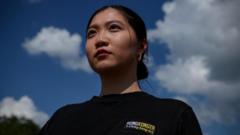In a significant move amidst ongoing tension regarding pro-democracy activism, Hong Kong police have arrested two relatives of Anna Kwok, a US-based activist, for allegedly assisting in her financial dealings. This marks the first instance of family members being charged under the territory's controversial national security law.
Kwok, a prominent figure in pro-democracy movements who fled Hong Kong in 2020, is accused of participating in the 2019 demonstrations which dissent from Beijing's tightening grip on the region's autonomy. Authorities allege that her father, Kwok Yin-sang, aged 68, and her brother, aged 35, were managing her financial assets linked to her insurance policies.
Police initiated investigations after noting the relatives' meetings with Anna Kwok overseas, leading to charges that could significantly exacerbate their legal troubles. The charges suggest a tailored approach by the government to pressure dissenters by targeting those linked to them. The elder Kwok has been denied bail by a national security judge, while his son has been temporarily released pending further inquiries.
The measures taken against Kwok's family highlight the extensive reach of Hong Kong's Safeguarding National Security Law, which criminalizes financial support made available to absconders. In recent months, authorities have escalated their campaign, placing bounties on several pro-democracy activists including Anna Kwok, who condemned these actions as harassment and intimidation tactics aimed at silencing dissent.
As tensions continue to rise, these developments underline the diminishing freedoms within the territory, raising concerns about the future of civic liberties that had previously distinguished Hong Kong from mainland China after its transition to a Special Administrative Region in 1997.



















